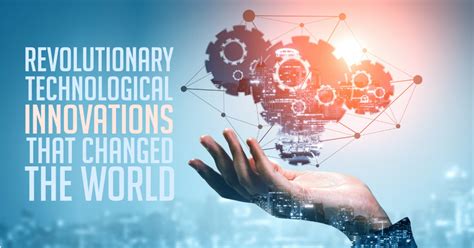Technology has become an irreplaceable force in our lives, shaping the way we live, work, and interact with others. From the ubiquitous smartphones in our pockets to the self-driving vehicles on our roads, technological advancements are transforming our world at an unprecedented pace. This chronicle chronicles some of the most significant technological breakthroughs of recent years and explores their potential impact on the future.

Artificial Intelligence (AI): The Power of Machines
One of the most groundbreaking technological advancements of our time is artificial intelligence (AI). AI refers to the ability of machines to perform tasks that typically require human intelligence, such as learning, problem-solving, and decision-making. AI algorithms are rapidly becoming more sophisticated, enabling machines to perform a wide range of tasks that were previously impossible.
Applications of AI:
– Healthcare: AI is revolutionizing healthcare by automating tasks, improving diagnosis accuracy, and developing personalized treatment plans. According to a study by McKinsey & Company, AI could generate $150 billion in annual value for the healthcare industry by 2025.
– Finance: AI is being used to automate financial processes, detect fraud, and make investment decisions. A report by Accenture estimates that AI could save banks $1 trillion in annual operating costs by 2030.
– Transportation: AI is transforming the transportation industry by powering self-driving vehicles, optimizing traffic flow, and improving safety. A study by the World Economic Forum predicts that AI-enabled vehicles could reduce traffic accidents by 90% by 2050.
Blockchain: The Immutable Ledger
Blockchain technology is a distributed ledger that allows transactions to be recorded securely and transparently. Each transaction is linked to the previous one, forming a chain of blocks that is virtually impossible to tamper with. Blockchain is best known for its role in powering cryptocurrencies like Bitcoin, but it also has numerous other applications.
Applications of Blockchain:
– Supply Chain Management: Blockchain can track goods and products throughout the supply chain, ensuring transparency and reducing fraud. According to a report by the World Bank, blockchain could save businesses up to $30 billion annually in supply chain costs.
– Healthcare: Blockchain can be used to secure patient records, track medical supplies, and facilitate clinical research. A study by the Healthcare Information and Management Systems Society (HIMSS) found that 84% of healthcare executives believe blockchain will have a significant impact on the industry.
– Government: Blockchain can enhance the security and transparency of government processes, such as voting, tax collection, and land registry. A report by Accenture estimates that blockchain could save governments $10 billion annually in anti-corruption measures.
Quantum Computing: The Limitless Possibilities
Quantum computing is a groundbreaking new computing paradigm that leverages the principles of quantum mechanics to solve complex problems that are beyond the reach of traditional computers. Quantum computers use qubits, which can exist in multiple states simultaneously, allowing for exponentially faster processing speeds.
Applications of Quantum Computing:
– Drug Discovery: Quantum computers could accelerate the development of new drugs by simulating molecular interactions and predicting drug efficacy. A study by the Boston Consulting Group estimates that quantum computing could reduce drug development time by 50%.
– Materials Science: Quantum computers can simulate materials at the atomic level, leading to the discovery of new materials with enhanced properties. According to a report by the National Academies of Sciences, Engineering, and Medicine, quantum computing could revolutionize materials science and create industries that are currently unimaginable.
– Financial Modeling: Quantum computers could be used to develop more complex and sophisticated financial models, enabling investors to make better decisions. A study by Goldman Sachs estimates that quantum computing could increase the accuracy of financial models by 30%.
The Future of Technology: A Vision for the Next Decade
As technology continues to advance, we can expect to see even more transformative applications emerge. Here is a vision for the next decade:
- Personalized Medicine: AI-driven medical devices will monitor our health in real-time and provide personalized treatment recommendations based on our individual genetic makeup.
- Augmented Reality (AR): AR technology will revolutionize the way we interact with the world, allowing us to project digital information into our physical surroundings.
- Autonomous Systems: We will see more autonomous systems in all aspects of our lives, from self-driving cars to robotic assistants.
- Quantum Internet: The quantum internet will connect quantum computers and create a new era of secure and ultra-fast communication.
Conclusion
The chronicle of technological advancements over the past decade is nothing short of astonishing. From AI to blockchain to quantum computing, these breakthroughs are reshaping our world in ways we could never have imagined just a few years ago. As we look ahead to the next decade, we can expect even more transformative technologies to emerge, leading to a future that is beyond our current comprehension.
